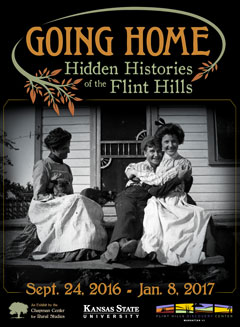September 16, 2016
'Going Home: Hidden Histories of the Flint Hills' opens Sept. 24
Submitted by Bonnie Lynn-Sherow

Work on the exhibit "Going Home: Hidden Histories of the Flint Hills" produced by the students and faculty in the Chapman Center for Rural Studies is nearly complete for its grand opening Sept. 24 at the Flint Hills Discovery Center in Manhattan.
The exhibit will feature seven special towns in the Flint Hills with original artifacts, an interactive map, several full scale rephotos, two documentary films, a children's area and a replica of a general store that serves as a sound booth for visitors to record their memories and upload them to the Library of Congress using the Story Corps App. Several tours and educational seminars also are planned for the duration of the show.
The exhibit has been nearly two years in the making, and will run through Jan. 8, 2017. "Going Home" showcases research conducted by students over the past decade to unlock the stories of home towns that were on the brink of being lost to memory forever.
Mark Chapman, a 1965 K-State history and political science alumnus, initiated the project in 2005 with a gift to the history department to help him preserve the memory of his own hometown, Broughton, Kansas. The result was the creation of a highly successful, multidisciplinary, undergraduate research lab. Since then, students have researched and published the stories of more than 150 towns.
"Although the Flint Hills are central to the research, the theme is something that all of us can relate to. A longing for the comfort of home is universal in human history," said Bonnie Lynn-Sherow, curator of the exhibit, director of the Chapman Center and associate professor of history. "We present what this means regionally, but visitors are invited to explore the meaning of home personally — and how that has shaped their identity."
Seeing their work published is exciting for students, but having it in an exhibit is exhilarating. As student Michael Spachek, who researched the life of blacksmith John Crisp from the vanished town of Chalk in Wabaunsee County explains in the video, putting a name to a picture, finding them in the historical record and recording the memories of their living relatives moved his understanding of the past out of the classroom and into a new reality that mattered to him personally.
Research director M.J. Morgan, who guided Spachek's work, believes that these experiences change students' lives forever, making them more attentive to the past and empathetic to others.
Lynn-Sherow asks, "Can we really go home again? Time changes everything, so can we really re-capture our past selves?"
"I think so, but visitors will have to determine that for themselves. We hope to provide them the clues," she said.
